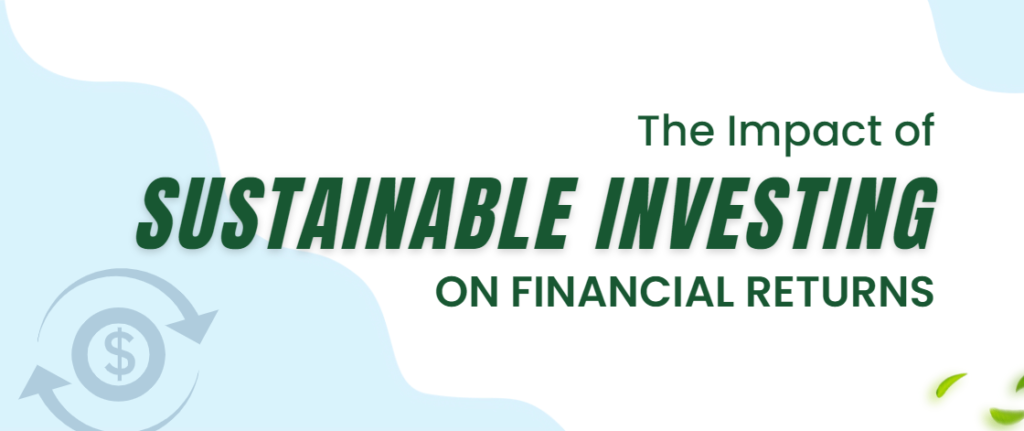
Sustainable investment, often also known as socially responsible investing (SRI), is a financial return approach considering environmental, social, and governance (ESG) aspects.
Investors are becoming increasingly worried about the impact of their investments on the environment and society, and they are attempting to connect their beliefs with their investing decisions. Sustainable investors look for firms that have a beneficial influence on the planet, such as those with great carbon emissions records, workplace diversity, and board independence.
In this blog, we will look at the notion of sustainable investment, Environmental, Social, and Governance Factors in Sustainable Investing, and The Effect of Sustainable Investing on Financial Returns.
We will start by learning the concept behind sustainable investing.

The Concept of Sustainable Investing
Sustainable investing is an investment strategy considering environmental, social, and governance (ESG) aspects while making investment decisions.
This investment strategy tries to provide long-term financial returns while simultaneously having a good social and environmental effect.
Climate change, human rights, labor standards, and corporate governance are examples of ESG elements. Sustainable investing promotes responsible business practices and urges firms to be more open and accountable by incorporating these criteria into investment decisions.
Sustainable investment may be accomplished through various approaches, including socially responsible investing, impact investing, and ESG integration. Socially responsible investing entails avoiding investments in firms that participate in harmful activities, such as cigarettes, weaponry, or fossil fuels.
In the next section, we will dive into the strategy of environmental consideration.

Environmental Considerations in Sustainable Investing
Environmental considerations are important in sustainable investment since they focus on the influence of a company’s actions on the natural environment.
Here are some crucial elements to consider when considering environmental factors in sustainable investing:
- Environmental Impact of the Company’s Activities
The influence of a company’s actions on the natural environment is the focus of environmental concerns in sustainable investment. Sustainable investors assess firms based on their environmental effect, which includes carbon emissions, water consumption, waste management, and renewable energy sources. Investors examine a company’s environmental policies and practices to determine its commitment to sustainable and responsible practices.
- Environmental Impact of Products and Services
Environmental factors in sustainable investment may include the environmental effect of a company’s products or services. Investors consider how a company’s products or services affect the environment and its attempts to offset any negative impact.
- The Supply Chain Management
Sustainable investors also assess a company’s supply chain management. Companies that perform business with suppliers that have bad environmental practices may face reputational and financial consequences. Investors examine how a firm controls its supply chain to ensure its suppliers are committed to sustainable and responsible practices.
- Using Tools and Strategies to Evaluate Businesses
Sustainable investors utilize various methods, such as ESG ratings and sustainable investing funds, to find firms that have a positive environmental effect and avoid those that do not. Investors can use ESG ratings to analyze a company’s environmental, social, and governance practices in a standardized manner. Sustainable investment funds invest in firms that prioritize environmental and social responsibility.
The next section is all about social considerations in sustainable investing.
If you need some ideas about what to read next, here they are:
- Managing Conflicts in Family Business: Strategies for Resolving Differences and Maintaining Harmony
- Active v/s Passive Investing: Which Strategy Fits Your Investment Goals?
- The Changing Landscape of Consumer Debt and the Relationship Between Consumer Debt and Recession Risk

Social Considerations in Sustainable Investing
Sustainable investing is an investment strategy that considers environmental, social, and governance (ESG) aspects to produce long-term financial returns while encouraging sustainable and responsible practices.
Social concerns are important in sustainable investment since they focus on a company’s social effect.
Here are some crucial elements to consider when considering social factors in sustainable investing:
- Civil Liberties
Investors assess a firm’s human rights policies and practices to ensure that the company respects human rights, such as freedom of association, non-discrimination, and fair labor practices. Investors also look for rules and practices to avoid human rights violations such as forced labor or child labor.
- Influence on Society
Social factors in sustainable investment concern a company’s influence on society. Investors analyze a company’s social policies and practices to determine its commitment to social responsibility. Employee relations, labor norms, human rights, community participation, and diversity and inclusion are all considerations that investors evaluate.
- Labour Standards and Employee Relations
Investors assess a company’s employee relations and labor standards to ensure that employees are treated fairly and that the workplace is safe. Investors also look for policies and practices encouraging work-life balance and employee well-being.
- Social Responsibility Promotion
The sustainable investment seeks to promote social responsibility and encourage businesses to practice social responsibility while attaining long-term financial success. Investors may push firms to adopt better social practices by investing in companies prioritizing social responsibility. Sustainable investment may also assist businesses in attracting socially conscious consumers and staff and avoid regulatory and reputational problems connected with bad social practices.
Sustainable investment promotes social responsibility and encourages organizations to embrace socially responsible practices while attaining long-term financial success. Governance consideration plays several roles in sustainable investing; let’s look at their major elements next.

Governance Considerations in Sustainable Investing
Governance issues are important to long-term investing since they focus on a company’s management and decision-making procedures. Investors can analyze a company’s long-term sustainability and capacity to manage risks and opportunities by examining its governance practices. Here are some crucial factors to consider when considering governance in sustainable investing:
- Executive Pay
Investors examine a company’s executive compensation practices to verify that the compensation plans match the company’s long-term strategic goals. Investors consider whether executive remuneration is linked to long-term success, whether it is consistent with shareholder interests, and if it encourages appropriate risk-taking.
- Management of Risk
Investors assess a company’s risk management practices to ensure that risks and opportunities are appropriately managed. Investors look to see if the firm has effective systems in place to identify and manage risks, has a solid risk management framework, and has policies and practices in place to encourage responsible risk-taking.
- Transparency and Corporate Ethics
Investors assess a company’s corporate ethics and transparency to ensure it runs with honesty and accountability. Investors consider whether the company has an ethical code that guides its decision-making processes, has effective processes in place to detect and prevent fraud and corruption, and provides adequate disclosure and transparency about its operations and financial performance.
- Responsible Governance Promotion
Sustainable investment promotes responsible governance and encourages businesses to adopt environmentally friendly and responsible practices. Investors may push corporations to adopt improved governance practices by investing in companies with effective governance practices. Sustainable investment may also assist businesses in attracting socially conscious consumers and staff and avoid regulatory and reputational issues connected with inadequate governance practices.
In the next section, we will talk about the impacts of sustainable investing on financial returns.

The Impact of Sustainable Investing on Financial Returns
The influence of sustainable investing on financial returns is a hotly debated issue among investors. The sustainable investment seeks to build long-term value by investing in firms that operate responsibly and sustainably. Here are some crucial factors to consider to comprehend the influence of sustainable investment on financial returns:
- Influence on Financial Performance
According to research, sustainable investment can improve financial success. Companies with strong environmental, social, and governance (ESG) practices outperform their counterparts over time. According to studies, sustainable investing techniques produce equivalent or greater returns than standard investment strategies.
- Risk Reduction and Increased Resilience
By concentrating on firms that effectively manage their ESG concerns, sustainable investing may minimize investment risk and boost resilience. Companies that operate sustainably and responsibly are more likely to avoid costly environmental and social liabilities, regulatory penalties, reputational harm, and other hazards that can impact financial performance.
- Better Corporate Performance
Sustainable investing may also boost corporate performance by pushing businesses to adopt environmentally friendly and responsible practices. Sustainable companies are more likely to innovate, optimize operations, and attract socially conscious consumers and staff. Sustainable practices can also contribute to cost savings, increased efficiency, and enhanced stakeholder relationships.
- Improved Risk Management
By incorporating ESG elements into investment decision-making processes, sustainable investing may contribute to better risk management. Investors can detect and control risks that standard financial analysis may overlook by incorporating ESG considerations. Sustainable investment can also encourage firms to evaluate long-term sustainability risks and opportunities, leading to more responsible risk-taking.
In the final section, let us look at a company that has been breaking records with its excellent models & functions, and proves to be a great investment alternative in current times.
The Bottom Line
In recent times, investors are increasingly using their capital to drive positive influence through their investments. For the same, investors are considering environmental, social, and governance (ESG) factors while making investment decisions to optimize their results. In this blog, we have discussed the notion of sustainable investment and looked at the environmental, social, and governance aspects of sustainable investing individually. Finally, we have also seen how sustainable investing affects financial results and how it might help investors contribute to a brighter future.
Join Our Newsletter
Elevate your financial game & join the ranks of elite investors with Secvolt’s exclusive newsletter.
Join Our Newsletter
Elevate your financial game & join the ranks of elite investors with Secvolt’s exclusive newsletter.
Don’t just dream of wealth; achieve it with Secvolt. Schedule a call today for personalized guidance on your investment strategy and join the ultra-successful.
Ready to unlock your wealth’s truest potential & cherish affluence?
Secvolt, our hedge fund, sets the bar high with a record-breaking performance of 262% returns in 2022. With the brilliance of our highly advanced quant models and the efficiency of our risk mitigation protocols, we are yet to see a loss!
We’re the perfect ally to help you succeed financially and build the lasting legacy you have always aspired for.
Get in touch today. YOUR LEGACY AWAITS YOU…





